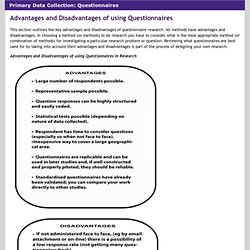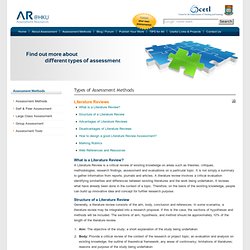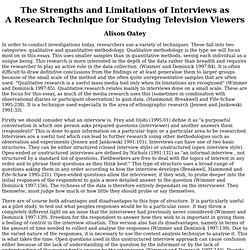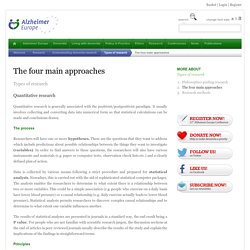

Advantages and Disadvantages of using Questionnaires. This section outlines the key advantages and disadvantages of questionnaire research.

All methods have advantages and disadvantages. Advantages and Disadvantages of using Questionnaires. OFFICIAL RESEARCH PROJECT nearly fin. CETL- Assessment Resource Centre. Types of Assessment Methods Literature Reviews What is a Literature Review?

A Literature Review is a critical review of existing knowledge on areas such as theories, critiques, methodologies, research findings, assessment and evaluations on a particular topic. It is not simply a summary to gather information from reports, journals and articles. A literature review involves a critical evaluation identifying similarities and differences between existing literatures and the work being undertaken. Strengths and Limitations of Interviews. In order to conduct investigations today, researchers use a variety of techniques.

These fall into two categories: qualitative and quantitative methodology. Qualitative methodology is the type we will focus most on in this essay. This uses smaller samples than in quantitative methods, seeing each individual as a unique being. This research is more interested in the depth of the data rather than breadth and requires the researcher to play an active role in the data collection. (Wimmer and Dominick 1997:84). Firstly we should consider what an interview is. The four main approaches - Types of research - Understanding dementia research - Research - Alzheimer Europe.
Quantitative research Quantitative research is generally associated with the positivist/postpositivist paradigm.

It usually involves collecting and converting data into numerical form so that statistical calculations can be made and conclusions drawn. The process Researchers will have one or more hypotheses. These are the questions that they want to address which include predictions about possible relationships between the things they want to investigate (variables). Data is collected by various means following a strict procedure and prepared for statistical analysis. The results of statistical analyses are presented in journals in a standard way, the end result being a P value. Principles. Qualitative vs Quantitative Data. Contact. The UK Data Service is an integrated service delivered and supported by a distributed team across the UK.

Our home office is at the University of Essex. UK Data Service University of Essex Wivenhoe Park Colchester Essex CO4 3SQ Contact details for our leaders, Governing Board and staff are at Our People. Helpdesk Use this link for all questions relating to the UK Data Service, its data and resources. Our web forms are designed to get your question directly to the experts most able to provide the answers you need. Subscription email Get updates from the UK Data Service right to your inbox. Note: Email services hosted by JISCmail. Website Use this link to let us know if you're having technical issues using the website, or if you have feedback that will help us improve the site. Qualitative%20research%20methodology. Schools 'face talent drain' as morale of teachers dives. Christine Gilbert, who resigned as head of Ofsted last year, says low morale comes despite the level of teacher professionalism being 'better than ever'.

Photograph: Graham Turner for the Guardian. Ethical Considerations and Approval for Research Involving Human Participants. From 1 October 2007 every piece of student or staff research that involves human participants needs to go through a formal process of research ethics review.

This is likely to affect researchers in some faculties and departments more than in others, but is applicable throughout the University. Why teachers leave the profession. Comment:5 average rating | Comments (11)Last Updated:12 January, 2014Section:Resources Tom Bennett is a man who believes that the beginning of wisdom lies in understanding that you know nothing.

In other words, he knows nothing, and he knows it. Every week he’ll be chasing his own tail or shouting at the laptop about some damn fool idea in education, or else he’ll be writing about classrooms, students, or why teaching is the most important job in the world. This week we have a cautionary tale told over a whisky tumbler about why teachers leave the profession… Met up with an old chum last week and had a sad conversation. Chief-schools-inspector-blasts-national-scandal-that-causes-40-per-cent-of-teachers-to-quit-within-five-years-9061790. Sir Michael Wilshaw outlined plans for a tough new inspection regime from September under which all new trainees would be quizzed as to whether their training had been adequate.

Why do so many teachers leave teaching. Apparently 50% of teachers leave the profession within their first 5 years.

I’ve heard this statistic bandied about for quite a while, and while you can argue the exact figure back and forth a bit (some estimates put the figure at 40%) either way it’s a bloody big number. Here’s another perspective: 404,600 fully trained teachers under the age of 60 are no longer teaching, compared to around half a million still actively working in English and Welsh schools. So that’s almost half of the qualified teachers in the country not actually teaching. Issues347. Numerous studies confirm that nearly one-third of new teachers leave the profession within five years. Why do they leave -- and why dont they stay? The reasons may surprise you. We all know the statistics.
Why Do New Teachers Leave? There are many theories as to why more than half of new teachers leave the profession within their first five years. Research suggests that many of the difficulties beginners encounter are environmental in nature, grounded in the culture of the teaching profession and the conditions of the school as a workplace. Four major trends emerge from research literature: New teachers feel overwhelmed by the expectations and scope of the job -- Teaching is a difficult job even for experienced educators. Teachers must meet the needs of all students in increasingly diverse school settings. They must efficiently handle excessive paperwork, become experts in time management, and establish positive connections between home and school.
Wilshaw warns staffroom 'moaners' 15 January 2014Last updated at 12:54 ET By Sean Coughlan BBC News education correspondent Sir Michael criticised those who portrayed teachers as "victims" with little control of their lives Ofsted chief Sir Michael Wilshaw says that teachers should stop presenting themselves as "victims". The head of the education watchdog warned it undermined the profession if teachers were seen as "serial complainers with another moan".
Sir Michael called for improvements in how teachers were trained for the "rigours of the classroom". Ofsted pledges to support new teachers as 40% leave profession within five years. Sir Michael Wilshaw said trainees were often inadequately prepared to deal with poor behaviour and had little support or no support from senior colleagues Teacher training will face tougher scrutiny to end the “national scandal” of two out of five recruits quitting the classroom within five years, it was announced today.
Ofsted chief: two-fifths of teachers quitting within five years is 'scandal' It is a "national scandal" that around two-fifths of teachers leave the profession within five years despite massive investment in training, Sir Michael Wilshaw has said. Many new recruits are quitting the classroom because they are inadequately prepared for dealing with unruly pupils, according to the Ofsted chief inspector. In a speech to the North of England education conference in Nottingham, he suggested that teacher training was not up to scratch, with trainees being tutored by individuals who had little up-to-date school experience, sent into the classroom without advice on behaviour or how to dress and left to "flounder" without support from more senior staff.
Individuals who persist in treating teachers as "perpetual victims" risk "infantilising the profession and depressing recruitment", he insisted. Wilshaw told the conference that serious questions needed to be asked about the current teacher training system. He added: "Of course, teachers have their complaints.